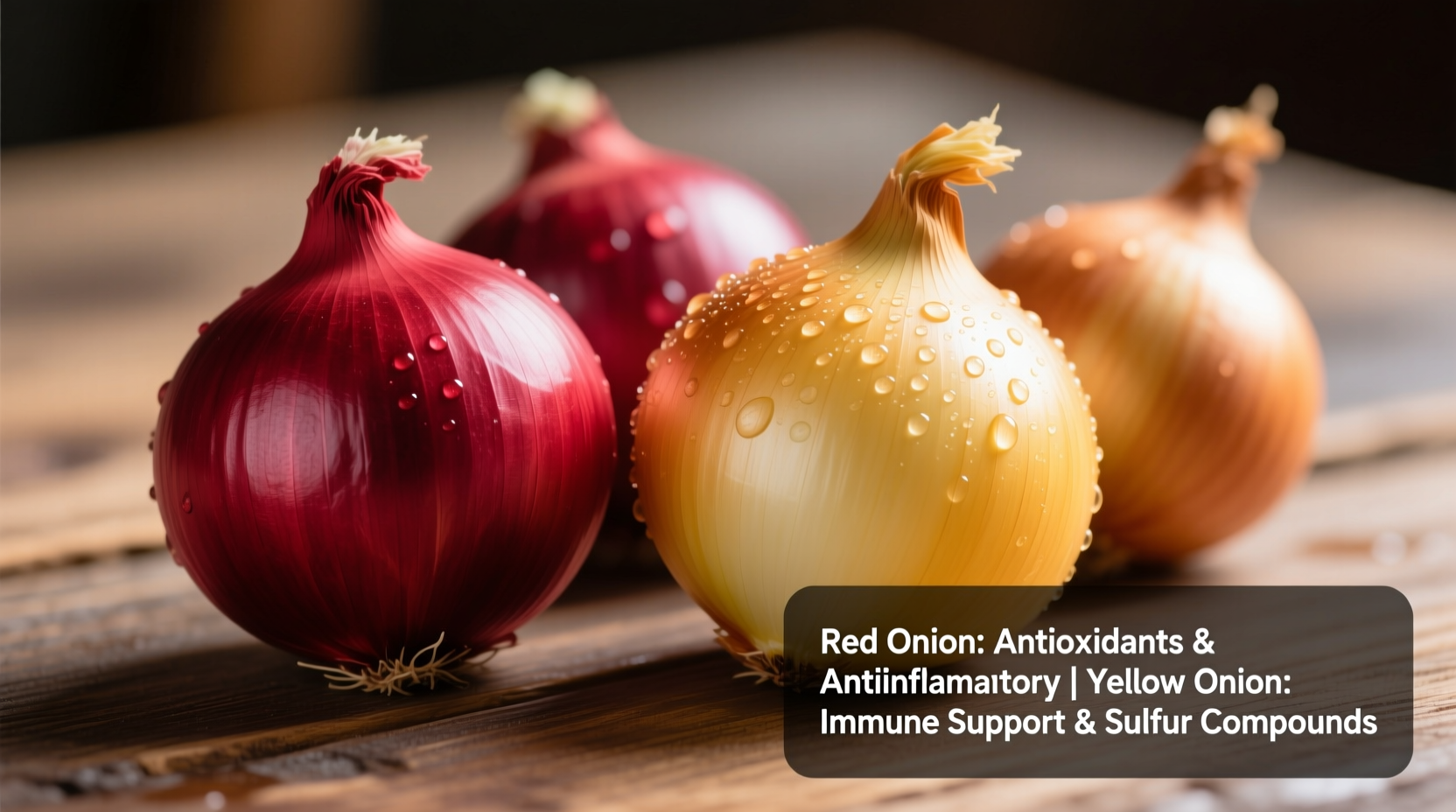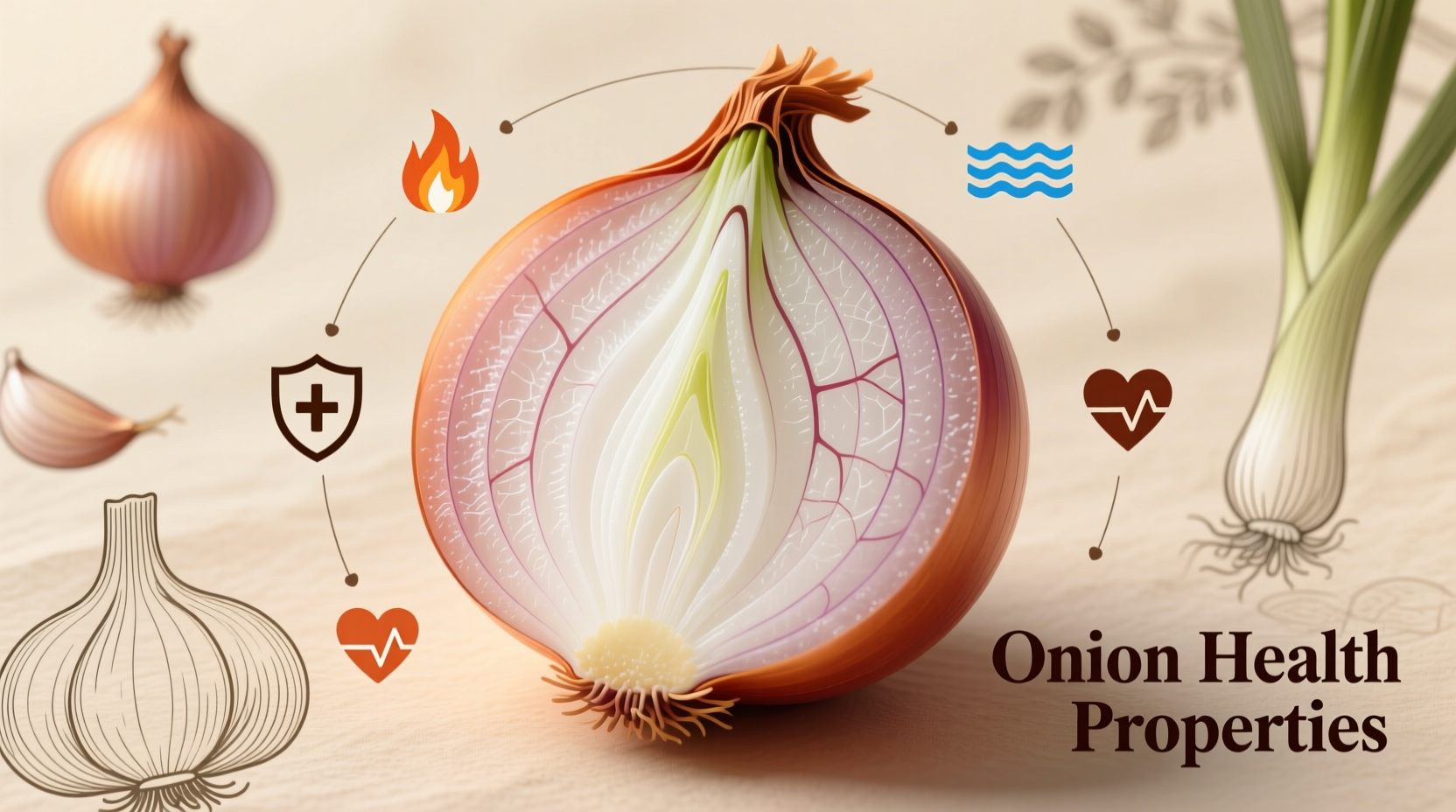For centuries, onions have been valued not just for their culinary versatility but for their remarkable health-promoting properties. Modern science continues to validate what traditional medicine systems worldwide have recognized for generations: this humble bulb packs a powerful nutritional punch. Let's explore what makes onions a true superfood worthy of regular inclusion in your diet.
The Science Behind Onion Health Benefits
Onions contain over 25 different flavonoids and a unique group of sulfur-containing compounds that form when onions are cut or crushed. These compounds, particularly quercetin and allicin, are responsible for many of onions' health-promoting effects. Unlike many vegetables, onions actually increase their antioxidant capacity when cooked properly, making them valuable both raw and prepared.
Key Health-Promoting Compounds in Onions
Understanding the specific compounds in onions helps explain their diverse health benefits. The most significant include:
- Quercetin - A potent flavonoid antioxidant with anti-inflammatory properties
- Organosulfur compounds - Responsible for onions' pungent smell and numerous health benefits
- Anthocyanins - Pigments in red onions with additional antioxidant effects
- Vitamin C - Essential for immune function and skin health
- Fiber - Supports digestive health and gut microbiome
| Onion Variety | Key Compounds | Unique Health Benefits | Best Preparation Method |
|---|---|---|---|
| Red Onions | High anthocyanins, quercetin | Strongest antioxidant activity, cardiovascular protection | Raw in salads, lightly sautéed |
| Yellow Onions | High sulfur compounds, quercetin | Bone health, anti-inflammatory effects | Caramelized, roasted |
| White Onions | Milder sulfur compounds | Digestive benefits, hydration | Raw in salsas, pickled |
| Shallots | Concentrated quercetin | Antimicrobial properties, blood sugar regulation | Raw in dressings, lightly cooked |
Cardiovascular Health Benefits: What Research Shows
Multiple studies published in the American Journal of Clinical Nutrition demonstrate onions' positive impact on heart health. The organosulfur compounds in onions help reduce blood pressure by promoting vasodilation and improving blood vessel function. Research from the National Center for Biotechnology Information (NCBI) shows regular onion consumption is associated with:
- Reduced LDL ("bad") cholesterol levels by up to 20%
- Improved HDL ("good") cholesterol function
- Lowered risk of blood clot formation
- Decreased arterial stiffness
A 2022 meta-analysis of 15 clinical trials confirmed that consuming onions regularly contributes to significant improvements in multiple cardiovascular risk factors. The American Heart Association recognizes onions as part of a heart-healthy dietary pattern.
Anti-Inflammatory and Immune Support Properties
Onions' quercetin content makes them particularly valuable for reducing inflammation throughout the body. According to research from Harvard T.H. Chan School of Public Health, quercetin inhibits the production of inflammatory markers like C-reactive protein. This anti-inflammatory effect extends to:
- Reducing symptoms of inflammatory conditions like arthritis
- Supporting respiratory health during seasonal challenges
- Enhancing immune cell function
- Protecting against oxidative stress

Practical Tips for Maximizing Onion Health Benefits
To get the most health value from onions, follow these evidence-based preparation techniques:
- Cut and wait - Allow cut onions to sit for 5-10 minutes before cooking to maximize beneficial compound formation
- Pair with healthy fats - Combine onions with olive oil to enhance absorption of fat-soluble compounds
- Don't overcook - Light cooking preserves more beneficial compounds than prolonged high-heat cooking
- Include raw onions - Raw red onions provide the highest quercetin content
- Store properly - Keep whole onions in a cool, dry place away from potatoes to maintain nutritional value
Realistic Expectations and Considerations
While onions offer impressive health benefits, it's important to understand their role within a balanced diet. Research from the USDA Agricultural Research Service indicates that consuming approximately 1/2 cup of raw onions daily provides significant health benefits without causing digestive discomfort for most people.
Certain individuals should moderate their onion intake:
- People with irritable bowel syndrome (IBS) may need to limit onions due to FODMAP content
- Those taking blood thinners should maintain consistent onion consumption rather than dramatic increases
- Individuals with acid reflux may experience symptoms with raw onions
Onions work best as part of a diverse plant-rich diet rather than as a standalone remedy. The synergy between onions and other vegetables creates greater health benefits than any single food alone.
Integrating Onions into Your Daily Routine
Here are practical ways to incorporate onions for maximum health benefit:
- Add raw red onions to salads 2-3 times weekly for peak antioxidant benefits
- Include caramelized yellow onions in soups and stews for bone health support
- Use shallots in salad dressings for enhanced nutrient absorption
- Try onion broth made from onion skins, which contains concentrated quercetin
- Combine onions with garlic and olive oil for a powerful health-boosting base
Remember that consistency matters more than quantity. Regular, moderate consumption of onions as part of your overall dietary pattern delivers the most significant long-term health benefits.
Frequently Asked Questions
What's the most nutritious way to eat onions for maximum health benefits?
For maximum health benefits, consume onions raw or lightly cooked. Raw red onions provide the highest quercetin content, while allowing cut onions to sit for 5-10 minutes before eating maximizes beneficial compound formation. Lightly sautéing onions in olive oil enhances absorption of fat-soluble compounds while preserving most nutrients. Avoid prolonged high-heat cooking which can degrade some beneficial compounds.
How much onion should I eat daily to gain health benefits?
Research suggests that consuming approximately 1/2 cup (about 80g) of raw onions daily provides significant health benefits for most people. This amount delivers sufficient quercetin and other beneficial compounds without causing digestive discomfort. For those with sensitive digestion, starting with smaller amounts and gradually increasing is recommended. Consistency matters more than large single servings - regular moderate consumption yields the best results.
Are red onions healthier than yellow or white onions?
Red onions contain higher levels of anthocyanins and quercetin compared to yellow or white varieties, giving them stronger antioxidant activity. However, yellow onions have higher concentrations of certain sulfur compounds beneficial for bone health. Each variety offers unique health properties, so including a variety of onion types in your diet provides the broadest range of benefits. For specific health goals, choosing the appropriate variety matters - red for antioxidant support, yellow for bone health, and white for digestive benefits.
Can onions help lower blood pressure naturally?
Yes, multiple studies confirm onions can help lower blood pressure. The organosulfur compounds in onions promote vasodilation (widening of blood vessels) and improve endothelial function. Research published in the American Journal of Clinical Nutrition shows regular onion consumption can reduce systolic blood pressure by 5-10 mmHg in hypertensive individuals. For best results, include raw red onions in your diet 3-4 times weekly as part of an overall heart-healthy eating pattern.











 浙公网安备
33010002000092号
浙公网安备
33010002000092号 浙B2-20120091-4
浙B2-20120091-4